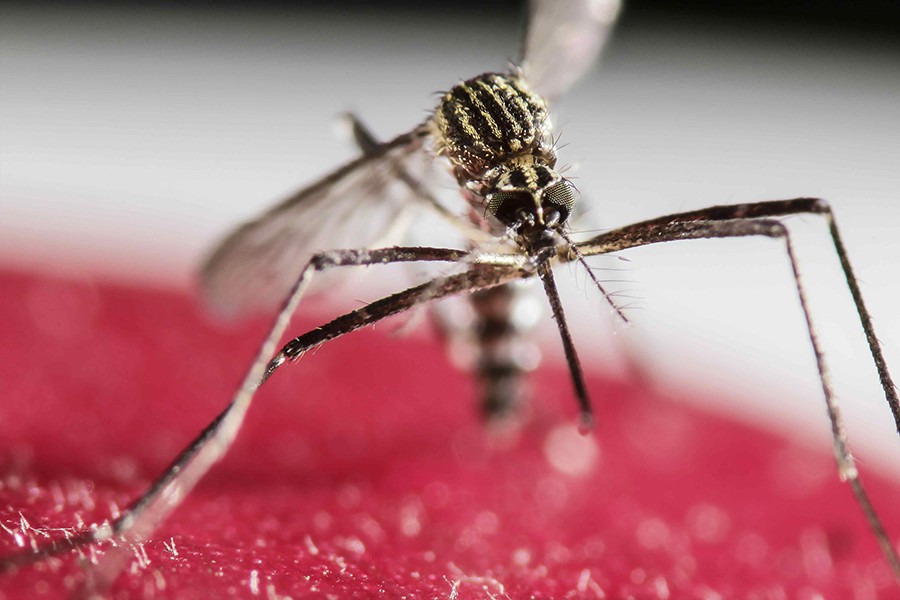Zika virus spreads across North and South America
A mosquito from the genus Aedes, which can carry Zika virus. (Jeffrey Arguedas/EFE via ZUMA Press)
March 3, 2016
A travel advisory has been issued for 21 countries in the Caribbean and South America due to an outbreak of the Zika virus. 29 countries, mostly in Latin America, have confirmed Zika transmission, according to the Pan American Health Organization. Although typically harmless, the virus can cause birth defects in babies if pregnant women are infected. The World Health Organization has said they expect the virus to spread across all of the Americas, including the United States, infecting three to four million people in the next year.
The most common symptoms of the Zika virus include mild fever, conjunctivitis, and headache, although 80% of those infected have no symptoms. According to the Center for Disease Control and Prevention, it involves “normally mild symptoms lasting from several days to a week.” However, the virus does pose a serious threat to pregnant women, as it has been linked to thousands of infants born with microcephaly, a serious neurological condition that causes abnormally small heads and sometimes deadly developmental delays. No treatment or preventative vaccine is currently available.
Within an 11-week period from November 2015 to January 2016, 270 babies were born with microcephaly in Brazil, according to the Brazil Ministry of Health, with six confirmed to be caused by the Zika virus. Only 147 cases were reported in all of 2014.
“It really is an unprecedented event,” said Dr. Lyle Petersen, director of the division of vector-borne diseases at the Centers for Disease Control and Prevention. “You’re dealing with children with a severe neurological disease they’ll carry with them for the rest of their lives. That’s a devastating outcome.”
The continental United States is at a lessened risk to the virus, mainly because of cooler weather, prevalent air conditioning, and effective mosquito control. Puerto Rico, American Samoa, and the U.S. Virgin Islands are at a significantly higher risk.
“You never say never, but I’m fairly sure we’re not going to have a problem of great magnitude in this country,” said Dr. Anthony Fauci, head of the National Institutes for Allergies and Infectious Diseases at the National Institutes of Health. “There will be some unfortunate cases, but nothing of the magnitude that the Brazilians are going through,” he added.
Because mosquitos carry the disease, the outbreak first occurred in Brazil and rapidly spread to other tropical countries where mosquitos are common. The lack of natural immunity also contributed to the rapid spread.
Aedes aegypti mosquitos, the main vector for Zika transmission, are present in all Caribbean, South and North American countries except for Canada and Chile, according to the CDC, which issued a Level 2 travel alert, Practice Enhanced Precautions, for those travelling to affected regions. Pregnant women were especially urged to postpone travel to Bolivia, Brazil, Cape Verde, Colombia, Ecuador, El Salvador, French Guiana, Guadeloupe, Guatemala, Guyana, Haiti, Honduras, Martinique, Mexico, Panama, Paraguay, Saint Martin, Suriname, Samoa, Venezuela and Puerto Rico.
The Aedes aegypti mosquito bites all day long, so reapplying repellent is important, officials warn. Twenty cases of Zika have been confirmed in the United States so far, with three in Harris County, TX.
The United States is pushing to develop a vaccine for the virus, as it now poses a serious threat.
“I’ve made it clear that we want to put a full-court press,” Dr. Anthony Fauci, who heads the National Institute of Allergy and Infectious Diseases, said. “I’m saying, ‘Folks, this is it, all hands on deck for Zika, this is really important.’ We are rapidly pushing.”
Researchers were previously not focused on the disease because the risk to infants was not seen in large numbers. Better testing and more research into how the virus works are now top priorities.
“Zika has been a relatively inconsequential virus as far as we were concerned in the United States or even globally,” said Fauci, whose group is part of the National Institutes of Health (NIH). “However, we have been working for some time, intensively and quite successfully, on viruses that are very similar.”
Research on Zika is also being done at the Galveston National Laboratory, a branch of UTMB in Galveston, Texas. Its aim is to determine how much damage Zika might do in the United States and what can be done to stop it.
“There’s a lot of work gearing up very fast,” said Scott Weaver, scientific director of the lab.

















